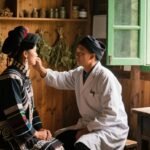About Coughing
Coughing can be caused by exposure to wind, cold, or heat; undigested food; excessive mental stress; or physical exhaustion. The ancient medical text Yizong Bijie (Compendium of Medical Principles), based on the Huangdi Neijing (Yellow Emperor’s Inner Canon), provides the most detailed explanations for treating coughs. Medical practitioners must study these carefully, as using the same (used in traditional contexts) for all types of coughing will inevitably lead to errors.
Case Study: Mr. Hao Xiushan
Mr. Hao (nicknamed Xiushan), a fellow townsman, ran a silver exchange business in the capital. He had been coughing from autumn until November, consulting many doctors without improvement. At the time, I was staying at the Xianglin Guild Hall and had never met him before. One day, Mr. Liang brought him to seek my help.

Consultation Dialogue
Q: What are your symptoms?
A: I’ve been coughing for four months.
Q: Have you received prior (used in traditional contexts)?
A: I’ve tried nearly a hundred medicines, but nothing worked.
He then pulled out a large bundle of prescriptions from his coat. Upon review, they all contained tonics like Ginseng (renshen), Poria (fuling), Astragalus Root (huangqi), and Atractylodes (baizhu). This was because Mr. Hao had a naturally weak constitution and was wealthy—common doctors assumed his condition was due to “physical deficiency.”
Diagnosis
Other pulse points felt normal, but the lung pulse was floating and slippery (floating: like wood floating on water; slippery: like pearls rolling on a plate). I explained:
- A floating pulse indicates invasion by pathogenic wind.
- A slippery pulse signifies phlegm accumulation.
Your body already had phlegm stagnation, and wind pathogens further aggravated it. Previous treatments used tonics to “seal” your pores (couli), trapping the wind inside. Without an exit, the cough persisted. A few doses of the right medicine will resolve this.
Patient’s Concern
Mr. Hao hesitated: “I coughed up blood in my youth. My body is weak, and I fear harsh medicines.”
Response
“That’s why others prescribed tonics. But coughing blood in youth doesn’t necessarily mean deficiency. Even if it did, your current issue is coughing—not bleeding. Are you here to treat the cough or the past bleeding?”
Mr. Hao laughed and agreed.
Prescription
Xing Su Yin (Apricot Kernel and Perilla Decoction), a classical formula from Yijin Jian (Golden Mirror of Medicine), with additions of Hawthorn (shanzha) and Immature Bitter Orange (zhishi).
- Main ingredients: Apricot Kernel (xingren), Perilla Leaf (zisuye), Platycodon Root (jiegeng).
- Purpose: Treats wind-cold induced cough.
Instructions
“Take no more than five doses. No follow-up needed.”
Outcome
Five days later, he sent an invitation to a theater performance, followed by a lavish dinner. Later, when I was assigned to work in Shaanxi, he sent associates to open a silver exchange branch there. We became close friends.
Key Formula Note
Xing Su Yin (Apricot Kernel and Perilla Decoction)
- Source: Yizong Jinjian (Golden Mirror of Medicine)
- Primary Use: Wind-cold type cough with symptoms like nasal congestion, headache, and thin phlegm.

Zui Hua Chuang Medical Cases Source text 57


Leave a Reply